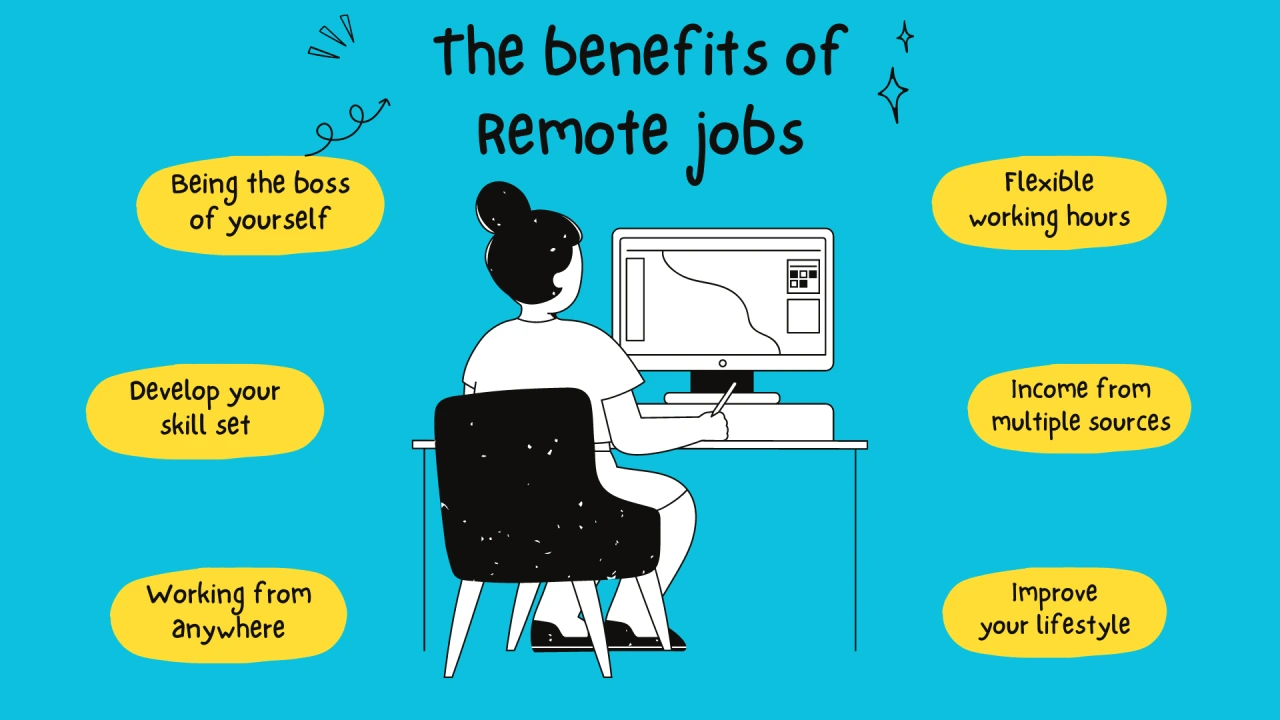Table of Contents
- 1 Advantages of remote work for employees
- 2 Advantages of remote work for employers
- 3 Remote work statistics and trends
- 4 Challenges of remote work and how to overcome them
- 5 Tips for successful remote work
- 6 Tools and technologies for remote work
- 7 Impact of remote work on the future of the workplace
- 8 Remote work policies and best practices for businesses
- 9 Future of remote work
- 10 Author
In today’s rapidly evolving work landscape, remote work has emerged as a transformative force, challenging traditional notions of the workplace. The rise of technology, coupled with global events such as the COVID-19 pandemic, has accelerated this shift towards remote job. As a result, businesses of all sizes are embracing the advantages and opportunities that remote work offers.

Advantages of remote work for employees
Remote work offers numerous benefits for employees, revolutionizing the way they approach their professional lives. One significant advantage is improved work-life balance. With the flexibility to work from anywhere, employees can better manage personal responsibilities while meeting work obligations. This newfound balance reduces stress and enhances overall well-being, leading to increased job satisfaction and productivity.
Furthermore, situs toto remote work opens up access to a global talent pool. Employers are no longer limited to hiring candidates within a specific geographical location. This means employees have the opportunity to work with diverse teams, leveraging different perspectives and experiences to drive innovation and creativity. Additionally, remote job eliminates the need for commuting, saving valuable time and reducing environmental impact.
Another advantage of remote work is increased productivity. Without the distractions of a traditional office environment, employees can focus on their tasks and deliver high-quality work. Studies have shown that remote workers often achieve higher levels of productivity compared to their office-based counterparts. This heightened productivity can lead to greater job satisfaction, career growth, and improved work performance.
Advantages of remote work for employers
Remote work not only benefits employees but also offers advantages for employers. One significant advantage is cost savings. By embracing togel online remote job, businesses can reduce overhead expenses such as office space, utilities, and equipment. This can result in significant savings, allowing companies to allocate resources to other areas of the business, such as research and development or employee development programs.
Additionally, remote work allows businesses to tap into a wider talent pool. Without the limitations of geographical boundaries, employers can attract and hire the best talent from anywhere in the world. This expands the pool of qualified candidates, increasing the chances of finding individuals with the skills and expertise necessary to drive the company’s success. With a diverse and talented workforce, businesses can gain a competitive edge in the market.
Furthermore, remote work can enhance employee retention rates. By offering flexible work arrangements, businesses can create a positive work environment that promotes work-life balance and employee satisfaction. This can lead to higher employee engagement, loyalty, and reduced turnover rates. Employees who have the freedom to work remotely are more likely to stay with the company long-term, contributing to its stability and growth.
Remote work statistics and trends
The rise of remote job has been steadily increasing over the years, with recent events like the COVID-19 pandemic further accelerating this trend. According to a survey conducted by Global Workplace Analytics, remote job has grown by 173% since 2005. Additionally, the survey found that 77% of workers expressed a desire to continue working remotely at least part of the time after the pandemic ends.
Furthermore, various industries have embraced remote job more than others. Information technology, finance, and professional services are among the sectors that have seen a significant increase in remote work adoption. Companies in these industries have recognized the benefits of remote job, including cost savings, increased productivity, and access to a broader talent pool.
Challenges of remote work and how to overcome them
While remote work offers numerous advantages, it also presents challenges that organizations need to address. One major challenge is maintaining team cohesion and collaboration. Without physical proximity, it can be difficult for team members to build relationships and work together effectively. To overcome this challenge, businesses can leverage technology tools such as video conferencing, project management software, and virtual team-building activities to foster communication and collaboration among remote teams.
Another challenge is ensuring effective communication. Remote job relies heavily on communication channels such as email, instant messaging, and video conferencing. However, miscommunication can occur due to the lack of non-verbal cues and the potential for technological issues. To mitigate this challenge, organizations should establish clear communication protocols, encourage frequent check-ins, and provide training on effective remote communication.
Security concerns also arise with remote work. With employees accessing company data and systems from various locations, businesses must prioritize cybersecurity measures to protect sensitive information. This includes implementing secure remote access solutions, conducting regular security audits, and providing employees with cybersecurity training to mitigate the risk of data breaches.
Tips for successful remote work
To thrive in a remote work environment, employees can follow several tips for success. First and foremost, establishing a dedicated workspace is essential. Having a designated area for work helps create boundaries between personal and professional life, enhancing focus and productivity. Additionally, establishing a routine, setting clear goals, and managing time effectively are crucial for remote work success.
Furthermore, maintaining regular communication with colleagues and managers is vital. Clear and consistent communication ensures alignment, reduces misunderstandings, and fosters a sense of connection and collaboration. Embracing technology tools that facilitate communication and project management can also streamline workflows and enhance productivity.
Tools and technologies for remote work
The rise of remote job has paved the way for innovative tools and technologies that enable seamless collaboration and productivity. Video conferencing platforms such as Zoom and Microsoft Teams have become essential for remote teams to conduct meetings, presentations, and virtual conferences. Project management tools like Trello and Asana help teams stay organized, track progress, and manage tasks efficiently.
Additionally, cloud-based file storage solutions like Google Drive and Dropbox allow for easy access and sharing of documents, fostering collaboration among remote teams. Communication tools such as Slack and Microsoft Teams provide real-time messaging, file sharing, and video calls, facilitating effective communication and team collaboration regardless of physical location.
Impact of remote work on the future of the workplace
The rise of remote work has the potential to reshape the future of the workplace in various ways. One significant impact is the reimagining of the physical office space. With remote work becoming more prevalent, businesses may opt for smaller, flexible office spaces that cater to occasional in-person meetings and collaboration sessions. This shift can lead to cost savings and a more agile work environment.
Moreover, remote work challenges traditional work culture and organizational structures. As employees work remotely, organizations need to adapt their management styles and embrace more outcome-based approaches rather than focusing on hours worked. This shift in mindset can foster a results-driven work culture that values productivity and output over physical presence.

Remote work policies and best practices for businesses
To effectively implement remote work, businesses should establish clear policies and best practices. Remote job policies should outline expectations, guidelines for communication and collaboration, and cybersecurity protocols. Additionally, businesses should provide training and support to help employees navigate the remote job environment successfully.
Flexible work arrangements, including remote job options, should be integrated into the company’s culture and employee benefits. This demonstrates a commitment to work-life balance and employee well-being. Regular feedback and performance evaluations can also help managers assess remote employees’ progress, provide coaching and support, and ensure accountability.
The rise of remote job has transformed the way we work, challenging traditional notions of the workplace. With its numerous advantages for employees and employers alike, remote work has become a permanent fixture in the modern work landscape. By embracing remote job, organizations can unlock the benefits of improved work-life balance, increased productivity, and access to a global talent pool.
Future of remote work
However, remote job also presents challenges such as maintaining team cohesion, effective communication, and addressing security concerns. By implementing best practices, leveraging technology tools, and establishing clear policies, businesses can overcome these challenges and create a successful remote work environment.
As we navigate the exciting landscape of remote job, it is clear that its implications for the future of the workplace are profound. From reimagining the physical office space to transforming work culture and organizational structures, remote work offers endless possibilities for businesses and employees alike. By embracing remote work, organizations can position themselves for success in the evolving work landscape of the future.

